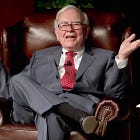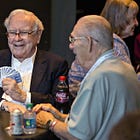Buffett Accelerates Gifts to Family Foundations
For the second year in a row, Warren Buffett has made gifts to four family foundations in excess of the annual commitments pledged in 2006.
On November 21, Warren Buffett converted 1,600 Class A shares of Berkshire Hathaway with a market value of $876.2 million into 2.4 million Class B shares in order to make gifts to four family foundations in excess of the annual gift pledges he originally made in 2006. This is the second consecutive year of supplemental gifts to the family foundations timed to coincide with the Thanksgiving holiday.
In June 2022, following Mr. Buffett’s annual gifts to the family foundations as well as to the Gates Foundation, I wrote a long article to document how the annual gifts were structured. By converting his Class A shares to Class B shares prior to making the gifts, Mr. Buffett has been able to part with over half of his economic interest in Berkshire Hathaway while maintaining the vast majority of his voting power.
Although the number of shares donated annually has declined, the dollar value of the gifts has increased significantly, albeit irregularly, over time as Berkshire’s shares have continued to appreciate. Rather than repeating a description of the mechanics of the donations, readers interested in further details should read my earlier article:
With over 99% of Mr. Buffett’s wealth destined for philanthropy, it is perhaps not surprising that he would wish to give away more of his shares while still living. At the age of 93, Mr. Buffett reports that he feels good but realizes that he’s “playing in extra innings.” Apparently, accelerating his giving is also due to growing confidence in the wisdom of his children who are all now between 65 and 70 years of age and have been named as executors of his will and trustees of his charitable trust:
“My three children are the executors of my current will as well as the named trustees of the charitable trust that will receive 99%-plus of my wealth pursuant to the provisions of the will. They were not fully prepared for this awesome responsibility in 2006, but they are now.”
At the time of Mr. Buffett’s death, a charitable trust will receive over 99% of his wealth with decisions regarding the trust requiring unanimous consent of his three children.
How a man chooses to dispose of his estate is properly a private matter, but Mr. Buffett has long been open about his intentions because of his large ownership of Berkshire Hathaway stock. To the extent possible, he has instructed that the trust will be funded with his Berkshire shares. Although the trust will be “self-liquidating” after about a decade, it appears that there will be no large sales of Berkshire Class A stock immediately after Mr. Buffett’s death. Presumably, his children will continue the practice of converting Class A stock to Class B prior to giving the shares to the foundations that will ultimately sell the Class B shares and distribute the funds.
Of course, the gradual conversion of Class A shares to Class B, along with the donations made by the trust, will gradually change both the ownership of Berkshire as well as control of the company. Mr. Buffett comments on these matters at length:
“The testamentary trust will be self-liquidating after a decade or so and operate with a lean staff. To the extent possible, it will be funded by Berkshire shares. Berkshire – one of the largest and most diversified companies in the world – will inevitably encounter human errors in judgment and behavior. These occur at all large organizations, public or private. But these mistakes are unlikely to be serious at Berkshire and will be acknowledged and corrected. We have the right CEO to succeed me and the right Board of Directors as well. Both are needed.
In the short-term, Berkshire’s distinctive characteristics and behavior will be supported by my large Berkshire holdings. Before long, however, Berkshire will earn whatever reputation it then deserves. Decay can occur at all types of large institutions, whether governmental, philanthropic or profit-seeking. But it is not inevitable. Berkshire’s advantage is that it has been built to last.”
As things stand today, Berkshire’s board has much more skin in the game than a typical American board even when Warren Buffett’s shares are excluded, as I wrote in two articles following the release of the 2022 and 2023 proxy statements:
It is unreasonable and impossible to expect Warren Buffett or Charlie Munger to make any sort of guarantees about Berkshire’s long term future once they are no longer on the scene. Ultimately, Berkshire’s future depends on the wisdom of its management and board of directors. To avoid the downward pull toward the average American corporation, whoever controls Berkshire’s voting power in the future will have to ensure that the culture remains intact, as I explained in a 2022 article:
One of the inevitable aspects of the eventual conversion of Mr. Buffett’s Class A shares to Class B is that voting control will then be dominated by whoever owns the dwindling number of remaining Class A shares, as I explained in much more detail in the article on voting control.
Over time, we can expect that Berkshire’s intrinsic value will increase and the Class A stock price will continue to advance. At well over $500,000 per share, the Class A stock is unwieldy for all but wealthy individual shareholders and institutions. Individual shareholders who own Class A shares typically convert their shares to Class B prior to selling to avoid realizing capital gains tax on a full Class A share.
Unfortunately, I believe that longtime individual shareholders are likely to continue converting to Class B, thereby leaving large institutions in control of the Class A stock. This led me to propose a split of the Class A shares last year. Although bordering on heresy in the Berkshire world, I think that more individual shareholders would continue to own Class A shares if they traded in the neighborhood of $10,000 rather than $500,000, as I explained in much more detail in this article:
Based on my calculations following yesterday’s donations, Warren Buffett’s gifts to the four family foundations as well as to the Gates Foundation now total 383,787,351 Class B shares which were worth over $51.8 billion at the time the gifts were made.
If Mr. Buffett had not made these gifts since 2006, he would have retained ownership of shares currently worth over $138.5 billion. He continues to own Berkshire Hathaway Class A shares worth over $118.6 billion.
I should note that these figures do not include gifts Mr. Buffett has made to charities other than the five foundations. For example, in August, Mr. Buffett gave 50 Class A shares to an unnamed charity. It is difficult to not be blown away by the magnitude of these gifts which illustrates the power of massive compounding over very long periods of time coupled with unusual generosity.
If you found this article interesting, please click on the ❤️️ button and consider sharing it with your friends and colleagues.
Thanks for reading!
Copyright, Disclosures, and Privacy Information
Nothing in this article constitutes investment advice and all content is subject to the copyright and disclaimer policy of The Rational Walk LLC.
Your privacy is taken very seriously. No email addresses or any other subscriber information is ever sold or provided to third parties. If you choose to unsubscribe at any time, you will no longer receive any further communications of any kind.
The Rational Walk is a participant in the Amazon Services LLC Associates Program, an affiliate advertising program designed to provide a means for sites to earn advertising fees by advertising and linking to Amazon.com.







You can give away 99%+ of your wealth and there will still be critics accusing you of enriching family members via foundations. That’s the lesson I take from critics of Buffett’s philanthropy. It’s useless to argue with such people who almost never even have basic facts straight.
I wish he'd make some significant gifts to institutions that support his classical liberal (even traditional) values. Buffett has 30 years on me, but this 65 yr old is worried that Enlightenment values (free speech, individual rights, the scientific method, objectivity, etc) are in danger of disappearing. That would be a loss that makes any good Gates might do pale by comparison.